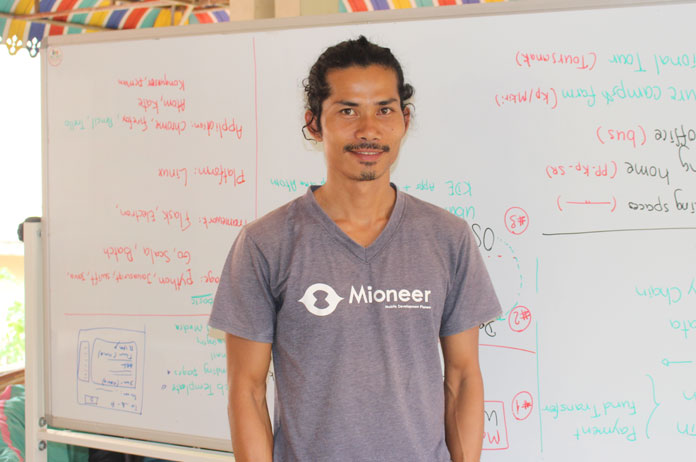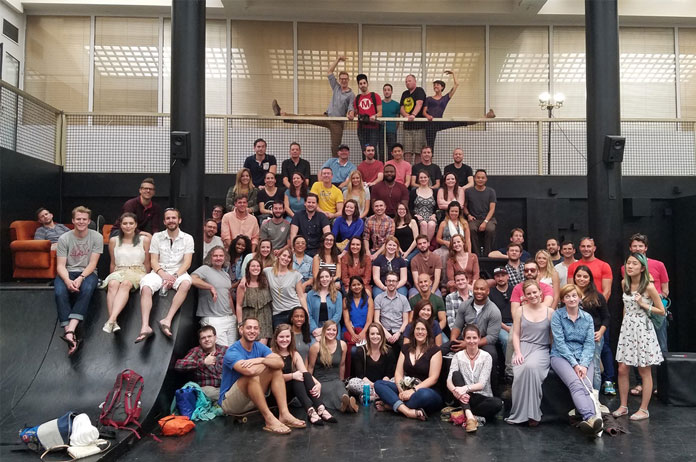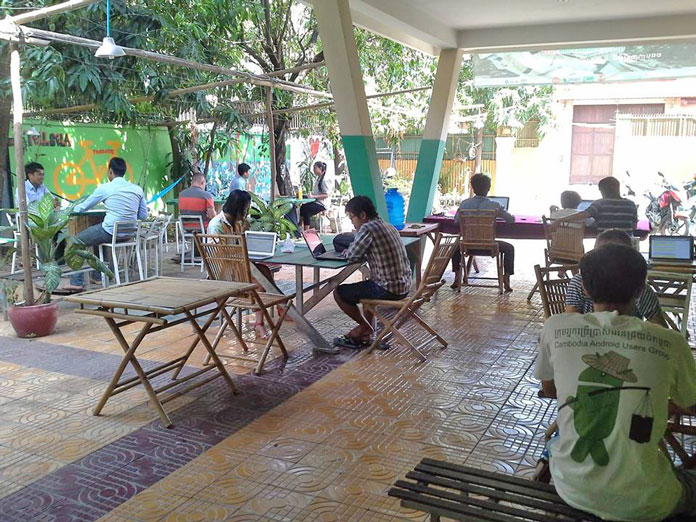The Cambodian Startup Scene: Q&A With Thul Rithy

Thul Rithy, the “serial” entrepreneur behind SmallWorld and EmeraldHUB, is passionate about building communities and connecting people. He just turned 30, but local entrepreneur Thul Rithy already boasts an incredible number of businesses to his name. He is the founder of popular co-working spaces SmallWorld and EmeraldHUB, and a number of other companies. His main interests are in the realms of technology, real estate and tourism. Raised in a humble family hailing from the lush and fertile Tunlea island in the Tonle Bassac river, 35km south of Phnom Penh, Rithy moved to the capital to continue his studies after high school. He took a job as a teacher of English and basic computer skills at an orphanage, but soon he realised that teaching wasn’t exciting and helping enough people for him. So he boldly decided to invest all his hard-earned savings into a new business idea. It didn’t work, and he lost all his money, but he doesn’t regret a thing – the experience set the basis for the success that was to come.
In 2007, he started a second company, this one focusing on real estate services, and in 2010, a travel agency specialising in adventure experiences. Rithy loved being an entrepreneur, but still felt something was missing. In his free time, he would spend countless hours messing around with Linux, an open-source computer operating system that embodied the very qualities he admires and seeks to uphold: sharing, community-building, problem-solving and innovation. In December 2011, to get closer to his real calling, he started SmallWorld, a co-working space where he has helped many tech startups flourish. Today, B2B Cambodia meets Rithy. If you are feeling uninspired by this year’s beginnings, read on – Rithy’s words might give you just the motivational boost you need:
You’ve started several co-working spaces in Phnom Penh that support budding entrepreneurs. What inspired you to commit so thoroughly to the local startup scene?
It ties back to the relation between Cambodia and development work. For the last 25 years, there has been so much money spent on development NGOs. The improvement for the country has been significant, but when we take into account the amount of money that has been invested, frankly, it is a little disappointing. Now, we can't focus on NGO work anymore. We have to find ways to open doors for people who have ideas, and give them a chance to do what they want to do. Give them the possibility to follow their dream. There were no places in Cambodia before where young people could spend time and work on the things they believed in. That is why I thought a place like SmallWorld was needed.
You recently teamed up with the Remote Year guys. What do you look for in a project to put your weight behind it?
Remote Year is a new type of startup. It’s not your run-of-the-mill travel agency. For me, it was simply a great opportunity to get to know this innovative company. More importantly, it was also an opportunity to connect local entrepreneurs with talented professionals from all over the world. Young Cambodian entrepreneurs are very talented and are doing a great job, but they need these kind of connections to amplify their world view and open their minds to new concepts, ideas and philosophies. These connections will open many doors for them.

You are an investor and promoter for bookmebus.com, a company that recently secured $15,000 from the Mekong Angel Investment Network (MAIN). In your view, how important is it to have angel investors in the local startup scene, and what access is there in Cambodia to other sources of funding?
The majority of funding that goes into startups in Phnom Penh comes from angel investors; people who are willing to take money out of their own pockets and tell entrepreneurs with promising ideas that they believe in them. The Cambodian branch of MAIN, known as Corco Angels, is funding a good number of projects. Entrepreneurs can always resort to bank loans, but I never do. It’s not just about the money, it’s also about the connections that you can develop with the people that are funding you. A relation with a bank will be purely financial, but with an angel investor you will also have their mentorship and whichever connections they can help you make. In my view, most businesses that just take money from a bank will fail because there is so much competition and you need more than just money.
You were involved in bringing TEDx to Phnom Penh. When will we enjoy another iteration of this inspiring event of public talks?
Our TEDx license has expired, so it looks like that won’t happen for a while. However, we started Khmer Talks, which is developing well, albeit slowly. Also, there is a group of young people, led by Mr. Ou Virak, who are putting together an interesting forum which seeks to answer questions as to how Cambodia will look like in 15 years. The talks given will fall under three categories: technology and innovation, demographics of the country, and political economy. They will follow a similar format to TED Talks.
Can you share with us some of the most exciting ideas currently cooking up at SmallWorld or EmeraldHUB?
We have some interesting startups working on e-commerce. You’ve heard about e-commerce in the Kingdom, how sloppy it still is. We don't intend to solve this problem, but we want to make it easier for shops to go online. Another noteworthy project seeks to place laptops in the hands of underprivileged high school kids. It’s an OLPC (One Laptop Per Child) initiative, and I am very excited about it.

Is local entrepreneurship properly supported by the government?
Not really, I think. Not just in Cambodia, but everywhere in the world. Startups are never supported the way they should be; never given the right direction. In Cambodia, I see two things happening. On the one hand, it’s really easy to start something. On the other, it’s hard to get your company growing and thriving, probably due to ineffective governmental policies. Worldwide, I see politicians really focused on creating regulation to rein startups in. In this case, I would say no regulation is better than bad regulation that controls and undermines companies. It is difficult to help startups if you are not one yourself. That is why, in my opinion, politicians often do a lousy job at this.
What new projects you have in mind for 2017?
2017 it’s all about new [co-working] spaces. We are going to open one more space in Phnom Penh to target Cambodian entrepreneurs. We would like to open in the BKK3 area, also known as Tuol Sleng, because we have customers that live in this area and have to drive far to get to EmeraldHUB or SmallWorld. It will hopefully open next month. We also want to open spaces in Siem Reap and Kampot. Our main goal for 2017 is to work with 300 startups around the country. Out of those 300, we hope to invest in at least 30.
As far as business consultancy goes, I am working on a new service with one of my companies to help bigger corporations adopt a better company culture. We’ve been working with startups for the past 5 years, and we feel we can share this experience with other enterprises. We are helping them develop a better company culture that will result in more productive employees and, ultimately, more income. Examples include giving more freedom to staff members and letting go a little of micro-management practises. We are also advising companies on how to invest extra-cash on staff development strategies that yield substantial results.
Finally, what would be your advice to budding young entrepreneurs?
I’m not comfortable giving advice. I think everyone should make their own mistakes and learn from them. However, if I have to, I would say that having a set of concrete goals is essential. But don’t fall into the trap of over planning. Educated people tend to plan every step of the process. By the time they are done planning, they are already bored of their idea. My advice would be to plan less, and get to work faster. Also, give yourself the freedom to think less about money. Focus on the development of your product or service. The money will come later, probably. Having a routine is also important. It could mean waking up or going to bed at a certain time everyday. Or perhaps taking on a sport and practising regularly. It could also mean writing a journal everyday. I’ve found it especially useful to write down your mission for the day. Even if one day you just want to sleep all day, take out your mission journal and just write “sleep”. It’s not so much about the mission itself; it’s about building a habit. A gratitude journal has also worked for me. Every one or two weeks, I write a thank you note to someone or to myself, to remind myself of the good things in my life.